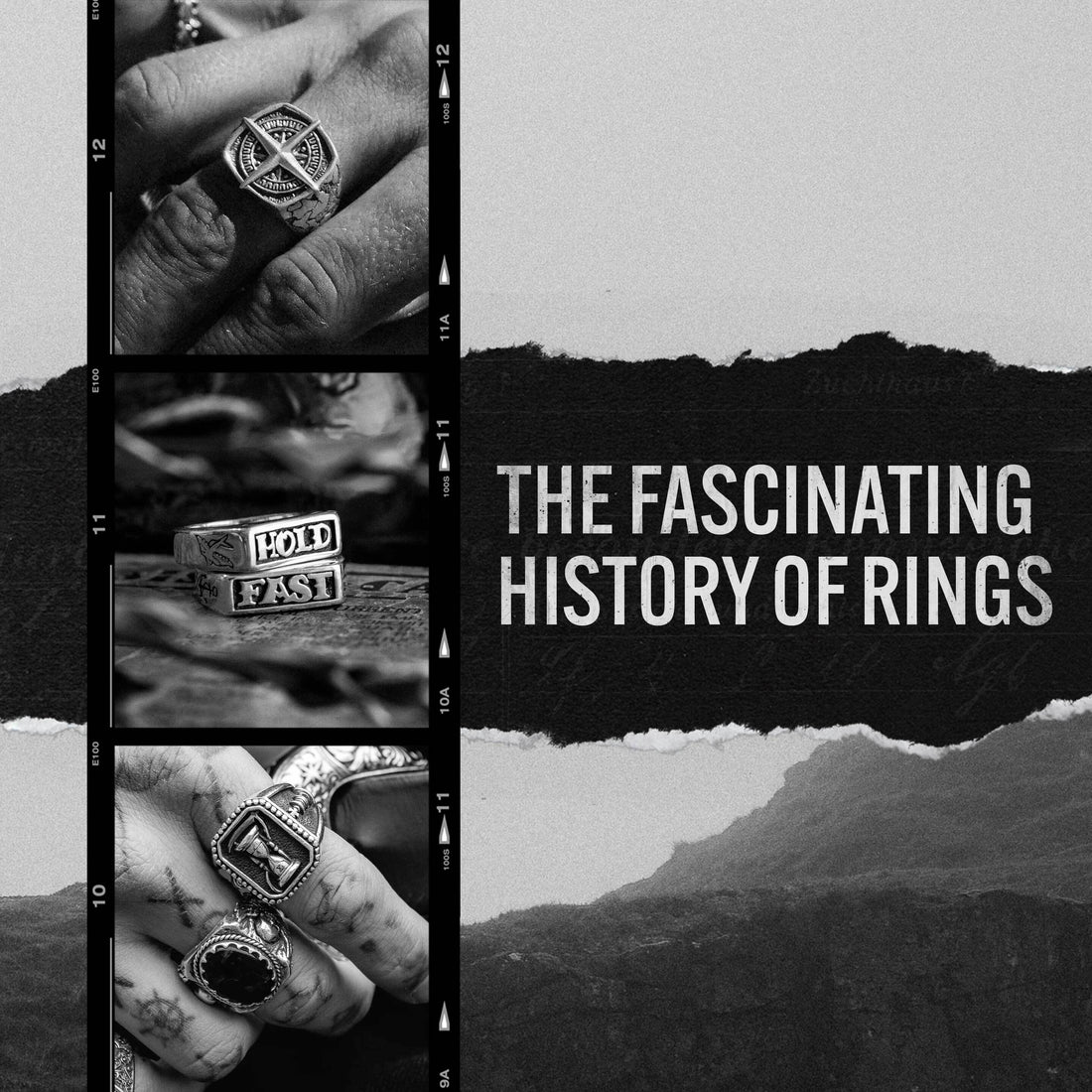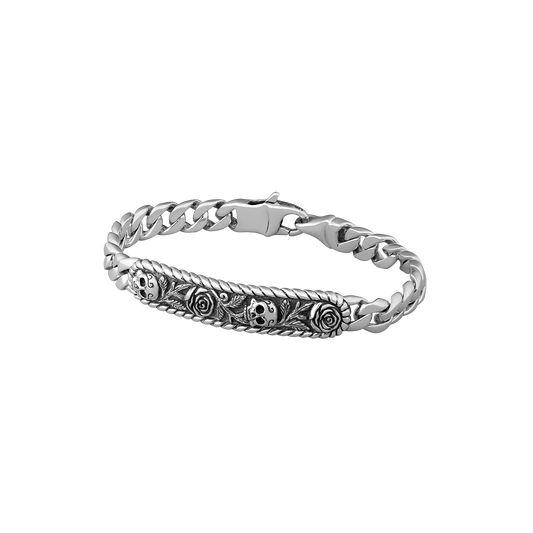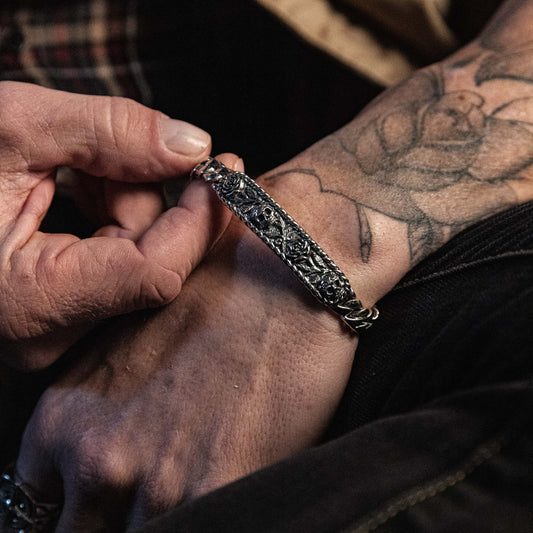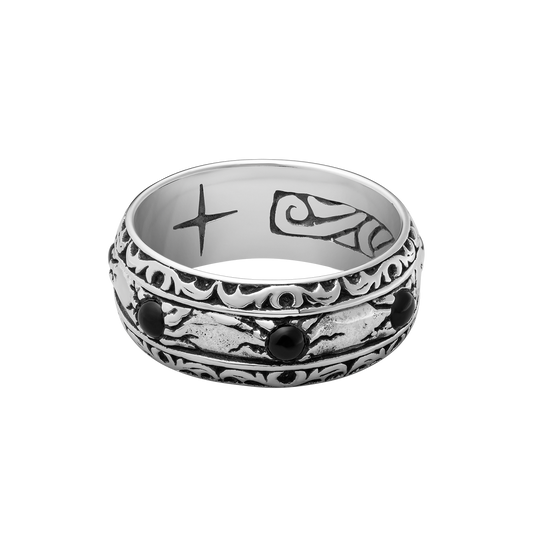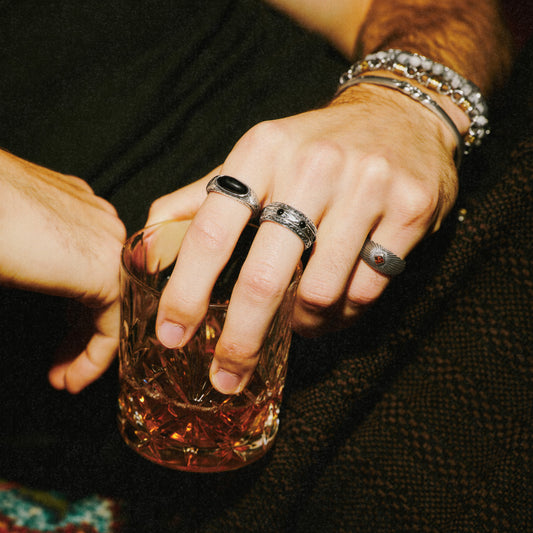Rings have been adorning fingers for ages, symbolizing love, status, and personal style. These incredible pieces of jewelry hold a special place in our hearts, capturing the essence of beauty and craftsmanship. In this blog post, we'll dive into the rad history of rings, exploring their origins, evolution, and ongoing popularity.
Ancient Beginnings
The story of rings kicks off in ancient times when the Sumerians, Egyptians, and Greeks were stoked about the beauty of silver. They even thought it had mystical and healing powers. As craftsmanship got better, silver rings became a major status symbol, worn by the high and mighty. Today, the legacy of these ancient adornments continues to shine through in modern sterling silver ring designs. For example, our men’s turquoise jewelry calls back to the timeless creations of Native Americans.

The Birth of Sterling Silver
Fast forward to the 12th century in Europe, and the sterling silver alloy we love today was born. They called it "sterling" because it came from "Easterling silver" – super high-quality stuff from Eastern Europe. Authorities wanted to keep it pure, so they set a 92.5% silver standard with a dash of copper or other metals for strength and durability. Today, sterling silver rings remain a popular choice for their timeless elegance and affordable luxury.
Medieval Rings: Power and Status
In medieval times, rings were all about showing off power and social status. Kings and queens flexed with opulent rings adorned with precious stones, proving they were the top dogs. The rich and famous followed suit, rocking rings that showed off their privileged lives. Meanwhile, the less fortunate kept it simple with humbler bands made from cheaper materials. Today, the allure of medieval-inspired rings continues to inspire modern designs that exude a sense of regal sophistication.

Renaissance Rings: Love and Commitment
When the Renaissance rolled around, rings started symbolizing love and commitment too. Engagements got a whole lot sweeter with rings as promises of future marriages. Diamonds and precious stones dazzled on these rings, making sure love sparkled for eternity. That tradition is still going strong today. The sentimentality and romance of Renaissance rings remain evergreen, making them a popular choice for celebrating love and eternal devotion.
Georgian and Victorian Rings: Opulence and Sentimentality
In the 18th and 19th centuries, rings got even fancier and sappier. Georgian rings went all out with intricate designs and delicate craftsmanship, dripping in diamonds and precious gems. These luxurious pieces symbolized wealth and status, elevating the wearer's social standing. Meanwhile, the Victorians were all about sentimental vibes, rocking rings with flowers, hearts, and bows to show love and deep connections. Today, vintage-inspired rings from the Georgian and Victorian eras continue to make a statement, offering a touch of old-world charm and timeless elegance.

Art Nouveau Rings: Nature's Inspiration
In the late 19th and early 20th centuries, the Art Nouveau movement took over ring designs. Nature was the big muse, with rings featuring organic lines and colourful gemstones inspired by flora and fauna. These weren't just rings; they were wearable works of art celebrating the harmony between humans and nature. Today, the artistic allure of Art Nouveau rings continues to captivate nature lovers and art enthusiasts alike.
Art Deco Rings: Streamlined Sophistication
The 1920s and 1930s gave us the Art Deco movement, bringing geometric shapes, bold lines, and serious modern vibes to rings. These rings were all about sophistication, often showcasing dazzling diamonds and gemstones set in platinum or white gold. The Roaring Twenties were all about being progressive and glam, and these rings nailed it. Today, the timeless elegance and geometric flair of Art Deco rings remain en vogue, catering to those with a penchant for vintage-meets-modern style.

Retro Rings: Playful Colours and Modern Tastes
In the 1940s and 1950s, rings embraced a more playful and colourful aesthetic. Retro rings were characterized by larger, eye-catching gemstones set in yellow or rose gold. They exuded a sense of fun and joy, reflecting the post-war optimism of the time. Retro rings offered a departure from the streamlined elegance of the previous decades, catering to a growing desire for self-expression and individuality. Today, retro-inspired rings add a pop of colour and retro flair to contemporary fashion, appealing to those with an affinity for nostalgia and vibrant styles.
Modern Rings: Innovation meets Quality meets Expression
Over the past decade, we at Clocks + Colours have been on a mission to revolutionize the world of rings, bringing you cutting-edge designs that empower you to express your unique style like never before. Our journey has been one of creativity and pushing the boundaries of traditional jewelry, all while celebrating the vibrant spirit of individuality.

As a part of our milestone celebration, we proudly present the Decade Collection—an ode to the last 10 years that have shaped fashion and culture. Each piece in this collection embodies the essence of this unforgettable era, capturing the energy and trends that have defined the decade. From bold statement rings to understated classics, the Decade Collection offers something for every personality and occasion.
A Decade of Unforgettable Style
Over the last 10 years, we've witnessed a fashion revolution, and we're proud to have played a part in it. Clocks + Colours rings have left an indelible mark, redefining what it means to wear jewelry that speaks to your soul. Join us as we continue to push the boundaries, explore new possibilities, and inspire a new generation of ring enthusiasts.
So, here's to the last 10 years of innovation, self-expression, and unforgettable style. We invite you to celebrate with us, wear your Colours proudly, and be a part of the Clocks + Colours journey as we embark on an exciting future together. Welcome to a world where your rings are as unique as you are!




